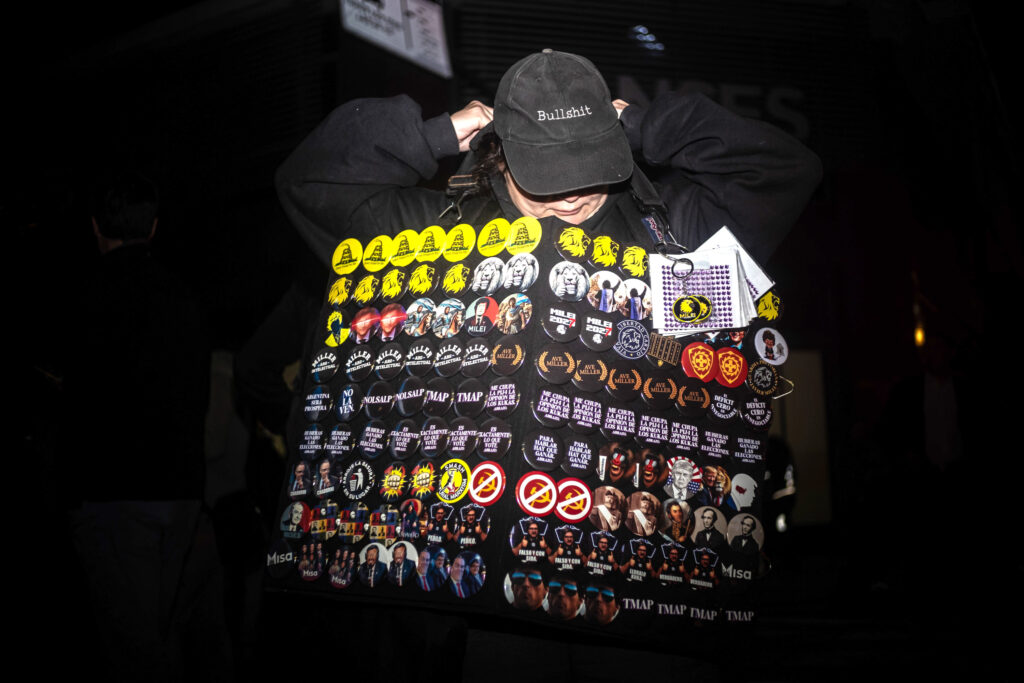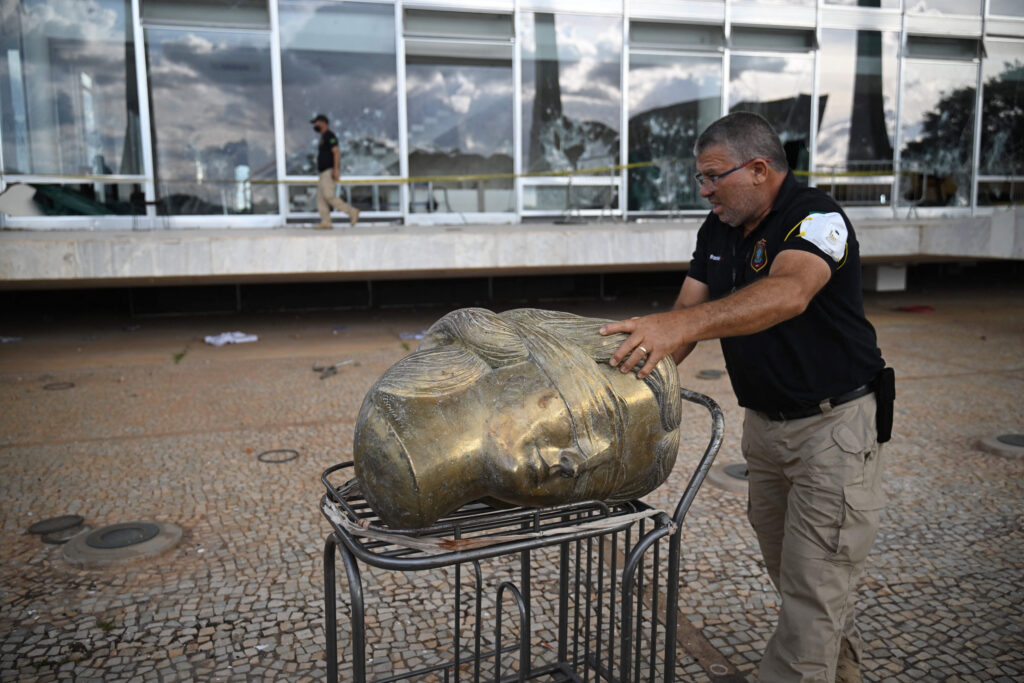The Right and the Upright
An Interview with Juan Elman

Journalist Juan Elman is a chronicler of the global far-right and its roots amid the parade of dissatisfaction that has upended political establishments worldwide—especially the appeal these ideas hold for his own generation. Juan’s insightful analysis and rigorous reporting, and his commitment to understanding the emotions underlying these reactionary political shifts, make his voice an essential one.
This month-long epistolary exchange was lightly edited for length and clarity.
Leonard Benardo: To begin, as someone who has followed the global right for some years now, what has surprised you, if anything, these last six months? Were any aspects of the authoritarian “toolbox” (that some insistently call it) new for you? Or has this all been yesterday’s news?
Juan Elman: We are living in a time when reviewing all the things that have happened in a week is complicated. Imagine six months! But I would say two things to start with. This scenario in which Trump’s determination to implement a radical agenda is mixed with chaos, permanent missteps, and a disoriented and passive attitude of the institutional opposition, was to be expected six months ago. I am perhaps surprised at how quickly Trump lost a certain aura of invincibility he had in the beginning, especially among his acolytes. It’s not difficult to find voices within the Trumpist ecosystem that already consider the project lost, as if Trump has been defeated by the establishment once again. What is interesting, though, is that this loss of perceived invincibility has not put his coalition at risk. The right is still united despite some fissures, and that is not a minor fact. I also think that part of the opposition, especially the institutional opposition, seems to have bought this narrative that Trump’s agenda was coopted by the establishment, mainly the judiciary. Or at least that’s what I noticed a few months ago. In these last few weeks, especially after the Supreme Court restricted the ability of federal judges to put limits on executive actions, the opposition is back to full alertness. But throughout this time, the government has been announcing measures whose effects on the economy, the social fabric and especially the power of the United States in the world have been devastating. The future of the legal battle, meanwhile, is unpredictable. I think that sometimes it is difficult to take stock of what we are living through, and sometimes I see in response to this a sort of cognitive dissonance.
The second surprising thing, regarding the authoritarian “toolbox,” is perhaps the role that El Salvador’s model has played in its foreign policy, with migrants as a bargaining chip. President Nayib Bukele has managed to export parts of his controversial policies of emergency— he has governed under a state of exception in which certain constitutional guarantees have been suspended for over three years, now—template for other leaders, especially Latin Americans, to deal with Trump: if you want to get along with the boss, you must receive migrants, no matter where they are from or what their status is. In return you’ll get some money and praise. This aspect surprises me more than other recent developments, such as the attack on universities or the media, which are undoubtedly worrying but also to be expected.
LB: As someone who has spent considerable energies following Trump-world, is all of what we are witnessing overdetermined in your estimation?
JE: That depends what you mean by “overdetermined.” If you are asking whether this scenario was inevitable, my quick answer is that it was not. Many things could have been done in the last few years to avoid what we’re witnessing now. Or perhaps you’re referring to the malaise and resentment of the Trumpist base, and the direction that ball of sentiments could take when coupled with the irritation of the digital age. Much has been written about that, and I tend to agree with analyses that put the focus on the deep roots of that malaise and resentment. But many times these analyses end up underestimating the role of Trump himself in all of this, as if he were a mere accessory in this story. If there is one thing I learned covering the world of Trumpism, it is the uniqueness and weight that the figure of the leader has. Trump is more than a symptom: he has politically represented that malaise and resentment of his base, and he’s the only one capable of driving it forward and giving it meaning. He has also been able to incorporate new and faithful followers, many of which are young people. So it’s not that he is irreplaceable, which he is. It’s that the uniqueness of his figure – of Trump himself – is more important than it often seems.
LB: Why do you think it is that Trump has not often been interpreted as a force in his own right, and is more, as you put it, an “accessory” at the right moment. Is this because the power of the right is often seen as a long-term project: all of those, say, counter-hegemonic Gramscian efforts from the Federalist Society on down, and thus structural reasons take primacy over agent-centered readings? This would be, of course, a curious contrast to the more traditional ‘great person of history’ approach that those on the right favor, no? What other reasons would you adduce to why Trump is not seen as an independent variable in all this?
JE: That’s a great question. Arguments about the structural causes of the recent advance of the far right are likely to be more sophisticated and intellectually challenging than paying attention to Trump’s own leadership. Analyzing the figure of the leader may seem vague or even lazy compared to structural analyses, although there are historical grounds for doing so. The challenge is to understand the elements of the leader that serve to catalyze, represent and amplify the malaise of the era which serve as the unit of analysis to compare with other historical moments. To clarify: I believe it’s vitally important to pay attention to the long cycle in the transformation of the right, with the Gramscian turn as one of its elements, as well as to the structural roots of American social malaise in recent decades. But anyone who spends time with Trump supporters knows that there are certain qualities about Trump himself that are—to put it in an unsophisticated way—special. He manages to mobilize varying degrees of affection. He can summon a group of southern white ladies who revere him as a religious figure, as well as non-political people who simply want to be part of the phenomenon, even with less intensity. There are ideological and sociological pieces that only fit together because of Trump. Understanding that is important. Trump is the only politician in the United States right now who is leading a movement. And I think that’s also why the debate about how solid his coalition is, or how much of his electoral power is circumstantial (and therefore fragile), is always up in the air. This has to do with the volatility of contemporary politics, but also because of the unique role that he has in giving cohesion and existence to the movement.
And I would add one more thing. It’s normal to see your ideological rival as stronger and more coherent than it really is. The intellectual right also speaks of the left as a powerful movement and a product of a long march, which included its own Gramscian twist (by the way, I think this is a more common reading among Latin American right-wing ideologues like Agustín Laje). The right generally thinks of itself as operating from a place of weakness. And the left often buys that narrative.
One of the main problems of the left today is the distance between small atomized social movements that express different demands and delegitimized political parties, which are seen as part of a failed order. A theorist of Latin American populism would tell you that only the arrival of a leader, whose timing and conditions of ascent are unpredictable, can give meaning to a new movement by articulating its demands. The problem with this idea is that it sounds too abstract and voluntarist. It sounds as if we are waiting for the arrival of a messiah. Although at this point it might not be too much to ask for one.
LB: You also claim that Trump lost his aura of invincibility. Are you saying this in the context of the last few months? Did he actually have that aura at any point in your estimation, and, if so, what happened to deplete its potency? And what exactly is this cognitive dissonance of which you write?
JE: Perhaps “aura of invincibility” is a bit much, but there is something in the perception of his power that seems to have changed after his first months in office. After the 2024 elections and even during the first weeks of his current presidency there was a consensus that Trump had more favorable circumstances than he did in 2017 to move forward with his agenda. I remember reading in a column something that I thought was accurate: that in his first victory Trump seemed like a vestige from the past, a dying gasp that interrupted the development of political events of the last couple decades, while in 2024 he seemed more contemporary, more of a harbinger of times to come. This idea was buttressed by the inclusion of a significant part of Silicon Valley in the Trumpist coalition, though it’s an alliance that still doesn’t seem quite firm.
We may be in a different chapter now. I did perceive a few weeks ago, especially because of the resistance of the judicial courts, that his image of power had diminished somewhat. I remember reading from commentators on the right and left the diagnosis that Trump was losing his battle against the establishment, and that we were witnessing a turning point. The latter may be true; the former I’m not so sure about. I think the momentum of the government has entered a lull, which was to be expected, and it’s not clear what will happen now, especially after the Supreme Court ruling on universal injunctions, which seems to have re-energized the Trumpist base, as well as the recent attacks on Iran.
It’s always possible that Trump is taking two steps forward, one step back—especially if he feels cornered and with a window of opportunity that is getting smaller, in part because of the coming midterms. But I wonder if we buy into this idea that Trump is being stopped because it’s reassuring. The destructive power of this administration is enormous, and we’re seeing major battles unfold every day, from the attack on the universities to literal battles on the streets of Los Angeles. The idea that Trump is eventually going to be defeated by the establishment can be reassuring. In some ways it’s similar to what I was telling you about the messiah: it’s a voluntarist gesture. That’s what I mean by cognitive dissonance: no one is unaware that we are living through an exceptional and transformative moment, but it seems as if we’re not acting like it. I recently read an article in The Guardian that revisited the concept of hypernormalization in the Soviet era: we all know that things are broken and order is falling apart, and yet we carry on as if nothing had happened. The text resonated with me because the same thing is happening in Argentina. We even invented another term for it: we call it fingiendo demencia, feigning dementia.
LB: I would like to ask about the term “toolbox.” Is it useful for your own comparative thinking on the Right or does it confuse more than clarify? Why do you think it has become such a watchword for interpreting authoritarian practice? Is it ultimately a lazy concept?
JE: As a faithful believer that the United States should pay more attention to the rest of the world, I will defend the “toolbox” concept. It’s useful to understand how the right is building a common repository of narratives, ideas, strategies and practices that spread with the speed of digital discourse but that also occupy an important place in face-to-face forums, such as CPAC. I think it’s important to pay attention to the global right not in order to predict the behavior of its leaders but to understand its transnational component. The experiences of each national case are taken into account by the far-right leaders. In this sense I think it is useful, although it is important not to see it as a closed and predetermined “manual” but as an open and dynamic repository, which adapts to different contexts but is also built collectively. It doesn’t seem lazy to me. It is lazier not to look at what is happening in the rest of the world and to take refuge in the particularities of each case, which always exist.

LB: I also appreciated your two cheers for leadership-focused explanations, especially regarding Trump. Your suggestion of the different perceptual worlds Trump walked into in 2016 and 2024, however, still indicates a structural dimension. Echoing Marx, people make their own history, just not under circumstances chosen by themselves! Agency and structure are always, at some level, interdependent.
When you intriguingly point to the mobilization of “different degrees of affection” it makes me wonder how distinct Trump is in embroidering different– often vastly different– sensibilities: the nonpolitical, the religiously febrile, the engaged citizen. Can you draw on any other cases of right-wing populists who were able to not just juggle but integrate into a larger movement such vastly different communities? And speaking of movements, you say that MAGA is the only movement in town (in America). Can you offer a little more here? Do I read you right that a different movement would need to have all the right trappings to compete with MAGA: charismatic leadership; clearly articulated political scripture; mobilization from below; and so on?
JE: An interesting case to look at is that of Jair Bolsonaro in Brazil. In 2018, the year he was elected, the Brazilian anthropologist Isabela Oliveira Kalil published a fascinating paper mapping Bolsonaro’s voters and their belief system. She came up with 16 different voter profiles. There were urban middle class families mobilized by the corruption cases against the Workers’ Party, police, military, evangelical pastors – typical profiles of historical right-wing voters – but also new ones, such as gamers under 25 years old or women against the discourse of “feminist victimization”. Isabella even talks about Afro-descendant and Indigenous voters rebelling against what they consider to be hypocrisy and condescension of the left. I mention this report because it seems to me that it revealed many trends that emerged with force several years later in the United States, especially with the case of young people and minorities.
The second thing I find interesting about this study is that Isabela finds a model to explain the points of connection between these voter profiles, which is that of the “upright citizen” (cidadão de bem). The concept had great explanatory force in the context of the mobilizations against the PT [Workers’ Party] in previous years by describing citizens who opposed corruption, and therefore the PT. To reject the PT was, in a way, to reject the corruption of the State. But in the following years, upright citizenship began to expand, meaning more and more things. An upright citizen became one who rejects “gender ideology” and who adheres to the project of “God, Homeland and Family,” popularized by Bolsonaro. And, crucially, an upright citizen is also one who prospers economically without help from the government.
I mention this because every time I read of the upright citizen I think of Milei, and how he also managed to create a figure of the “upright Argentine” who rejects state assistance and the progressive agenda as if they were part of the same thing. It is not by chance that Milei speaks of upright Argentines as opposed to the caste, which includes politicians but also academics, journalists, artists and intellectuals who “take advantage” of the State in an increasingly poor and unequal country. Here we have a leader who is able to build an “us” against a well-marked “them.” The interesting thing is how from events that mark a break with the current order—a series of mass mobilizations against corruption or an economic crisis—they manage to bring together a diversity of demands, agendas and sensitivities.
On the question of MAGA as a social movement, I’ll answer quickly. In a column written a few years ago, Julia Azari tried to differentiate between the traditional bases of a political party from those of a social movement, which is not only more loyal to the leader and presents greater ideological conviction but also strives for a radical change. And Trump, says Azari, must be understood as the leader of a social movement that has captured a party. This distinction is useful, although it’s important to note that not all of Trump’s voters are part of that movement, and that his electoral coalition is also susceptible to the ups and downs of the political times. But to understand the MAGA core and its dominance over the party is to understand that its behavior is not that of the traditional base of a party, and it certainly has nothing like it on the other side. In that sense it is unique. Within MAGA, the ascendancy that Trump has is incomparable to that of any other party leader. And, again, the emotional dimension I think is useful. When you go to CPAC and you see how these people who come from different parts of the country recognize each other and interact with each other you know you’re in the presence of something that has nothing to do with what’s going on in the Democratic Party. It is a movement that exists because of Trump.
And on the last question, what is important is the presence of a charismatic leadership and the mobilization “from below,” which at a certain moment clashes with the institutionalism of the Republican Party and overcomes it or founds something new. The existence of an “articulated political script” doesn’t seem so important to me. But a narrative is. A myth.
LB: On the subject of Brazil, We hear a lot of chatter about the anxieties around Lula, approaching 80, and with fairly dismal ratings (at roughly 28%). Can enough Brazilians cover their eyes as so many in Biden world did and let this go forward? More interesting for me based on your great expertise is whether a Bolsonarista is out there who can credibly succeed the former president? Alternatively, do you forecast Bolsonarismo as having already run its course with its best days behind?
JE: I just came back from a trip to Brazil so I have some fresh impressions, although I must clarify that I am not a specialist. But my feeling from talking to people close to the PT is that, unless something unforeseen happens, he will be the candidate again, this time with a serious chance of losing. Naturally there is concern about his age, but another equally important problem is the lack of achievements to show for an administration he took over with high expectations. Not only does Lula not have a successor in sight, but all the partners in his government – which functions in practice as a coalition – seem dissatisfied, which is a bad sign. Polls show that he remains competitive, and he has no close rivals in the center-left camp, but a victory in an expected runoff election would be difficult. Remember that, in 2022, Lula won the second round by only one point. Today the left needs a miracle to triumph in a second round.
The right-wing field is getting very interesting. The question is who will get the blessing of Bolsonaro, who is disqualified from running due to a court ruling. The strongest candidate for the moment is Tarcísio de Freitas, the governor of São Paulo with a military background and who was part of Bolsonaro’s government. His credentials are solid. But it remains to be seen what will happen with Michelle, the wife of the former president. The gossip is that Michelle could be Tarcísio’s vice-president in a deal negotiated with Bolsonaro, but it’s not clear. Another right-wing governor, sympathetic to Bolsonaro, could also emerge. And if the former president manages to sneak his surname onto the ticket through his wife, the big question will be the nature of his influence in an eventual government, which would lead us to another issue well known in the Latin American present: the tense coexistence between presidents and vice-presidents, which sometimes (as happened in Argentina with Cristina Kirchner) can be a source of instability. Another interesting point of comparison with the United States is that the Bolsonaros act like a clan, but do not always get along with each other, and there seems to be a division between Bolsonaro’s current wife, Michelle, and his children, especially Eduardo, his main spokesman in global right-wing forums. To the dispute within the right is added the dispute within the family.
I think it’s too soon to bury Bolsonarismo. The former president has held huge rallies of people that are in protest against the decision to disqualify him. The court cases against him—which his followers interpret as persecution—showed that Bolsonaro flirted with a coup d’état. But it seems to strengthen him politically, judging by the loyalty of the main presidential candidates, including Tarcísio. Bolsonaro’s resilience should not be underestimated.
That said, if the right wing returns to power without Bolsonaro as president, an uncertain scenario will open up. The paradoxical thing is that, seen through a regional perspective, the extreme right will face for the first time the challenge that leftist movements have faced in Argentina, Bolivia and Ecuador, in which the successors of popular leaders who are still in the picture come to the presidency. In all three cases there have been problems. The extreme right will have a similar test in Brazil if it wins the presidency.
I believe that the issue of succession in the leadership of the contemporary extreme right has not been much studied, perhaps because of the lack of successful cases. So far, electoral challenges from new candidates to established leaders (I am thinking of Ron DeSantis in the United States and Éric Zemmour in France, for example) have not been successful. The original leaders have persisted. The only case that comes to mind where far-right voters changed leaders is with Giorgia Meloni in Italy, who managed to win over Matteo Salvini’s base. But I think that she is the only one. In this sense, the elections in Brazil and in Hungary, where Viktor Orbán is facing a challenge on the right for the first time (by Péter Magyar), will be very interesting to watch.
LB: Many thanks Juan for these musings and explanations as they offer so much food for thought. I have long believed that one of the major forces in contemporary politics and one of the least studied is that of hypocrisy and double standards. I believe that the Right has benefited more from it, perhaps because liberals tolerate hypocrisy more easily, or because the Right has made it a central part of its political rhetoric. Do you see the question of political hypocrisy across countries more a phenomenon that the Right has exploited, and what’s your understanding of the idée fixe it has seemingly become?
JE: I believe that the right has managed to point out and take advantage of a trait that is quite present in the contemporary left: a certain sense of moral superiority. The idea that leftist leaders, intellectuals and voters look with disdain at people who are more likely to vote for the right, people who are less educated, more religious and more conservative in general. And I think there is some truth to this. On the other hand, something that was clearly seen in the last election in the United States was how a discourse critical of left-wing leadership emerged from different Latino and Black communities, pillars of the Democratic coalition that seemed to take the support of these groups as a given. This isn’t something new, and this criticism was always present in minorities that voted with the right, but in the last election it emerged with force, and it points to something important.
Specifically on the Latino issue, the right is approaching these groups from a place more open to listening, while the left there is often disinterest and sometimes disdain, not to mention racism. It is much more common to hear and speak Spanish at the Republican Convention than at the Democratic Convention. This is not to say that the right is not hypocritical with these groups, towards whom it has repeatedly expressed deep contempt. But it has managed to exploit the distance that the left sometimes holds with these groups. Taking the crux of your question, I think the difference is that, in its discourse, the left denies that distance, while the right actively works to close it.
Versions of this dynamic also appear in Latin America, where precarious and impoverished sectors denounce the left for being disconnected with their concerns, even while the left claims, above all, to represent them. The right has done nothing for these groups, but it doesn’t attempt to speak for them. I suppose this is a way of saying that I agree with how this particular form of hypocrisy – a commodity spread across the ideological spectrum – affects the left most today, which is also accused of being inauthentic. But this leads me to suggest that we need to pay more attention to an important element: money. Many leaders of the contemporary left, without distinction of party or age, live as well-to-do people, in a context of generalized impoverishment. I think there is a phenomenon of gradual oligarchization within the left to which we have paid little attention, and it is quite important.
LB: What are the implications of the “upright citizen” concept that you tantalizingly draw out here? I suppose we should be pleased that at least the Right speaks of citizens and not subjects (though I suppose some might gravitate to the latter!), but what does this mean about those who are not “citizens,” upright or otherwise? Can Venezuelans in Brazil, say, or Haitians in Argentina ever ascend to becoming “upright citizens” or does the Right know already of whom it speaks?
JE: Of course, the concept of “upright citizen” is, almost by definition, an exclusionary category. People who do not conform to traditional sexual morality or who need social assistance because their lives could be in danger are excluded from the camp, whose borders are defined by the right. The question of foreigners brings us to an interesting terrain. When Bolsonaro and Milei speak of “upright” Brazilians and Argentines, they are leaving out immigrants. But it is a flexible enough category that eventually there may be an appeal to immigrants or foreigners who behave in a certain way. For example: an immigrant who does not ask for state aid, who is self-employed, pays his taxes and does not commit any kind of crime could fall into the category of “upright citizen.” In the United States we are already seeing some of this. And in Latin America a relevant phenomenon is happening with the right wing’s appeal to Venezuelans residing in countries such as Chile or Argentina, who will eventually be able to participate in elections. Many of them, largely due to the disaster they have escaped from, feel a deep aversion to any left-wing variant, and tend to support the right whenever they can. The right, in turn, takes advantage of this rapprochement to invoke the Venezuelan crisis—a sensitive issue for the Latin American left—to its advantage. I believe that as the migration crisis deepens in the hemisphere, such appeals will become increasingly prevalent.
LB: Leadership succession on the Right is likely a theme for some naval gazing political scientists at land grant institutions in the American midwest but it hasn’t caught on in the public debate. Is the absence of consideration about the future merely a function of the fact that Right-wing political elites have a forever time horizon about their political project (a la a thousand-year Reich)?
JE: I’m not sure. Even if the elites have that kind of horizon in mind, the leaderships could eventually be replaced if they continue to serve their interests. I think the reason has more to do with lack of challenge or a real threat to the current right-wing leadership within their camp. This may be due to a grassroots loyalty built over time, as we saw with Bolsonaro and Trump, for example. But also to the particular worldview they manage to mobilize. Not long ago, losing elections was a condition that disqualified you from continuing to lead a party. Now, if your voters do not accept the results, losing elections not only does not disqualify you but can even empower you. The same happens with court cases. Before, being indicted by the justice system tarnished you; now it can give you the status of a martyr. If right-wing leaders can convince their voters that they are victims of a conspiracy, it becomes harder to replace them.
LB: Last, a biographical question. You are a superlative journalist-ethnographer of the contemporary Right. Give us a sense of what drew you to this space, and what have you gained and suffered by dint of it?
JE: First of all I must reject your generous description as a matter of good taste. That said, the fact that my first professional steps were taken with Trump’s victory in 2016 led me to pay attention to that world, which had clearly been transformed and to which a significant part of the progressive intelligentsia was not paying attention. I wanted to understand what was going on there, and to understand how the Trump experience was spilling over into other places around the globe. I got a first glimpse when I started covering the incipient youth right-wing movement that was emerging in Argentina, years before Milei’s triumph. For me there was a concern that was also generational: many people my age and from my environment were being seduced by the libertarian and anti-feminist movement. Then I started to travel and those questions became the key to meeting different people, and expanding my readings. I think all journalists have a natural inclination toward curiosity and conversation with people who aren’t like us. We are drawn to the lives of others, and sometimes the farther away, the better.
I suppose there is also a sense of urgency, knowing that much of what was going on in that right-wing world was politically relevant but also said something about the state of affairs in the world. It was a kind of testimony in itself. That’s partly why, to answer your question, a lot of what I see worries and frightens me. I don’t romanticize it. But I’d be lying if I did’’t say that I’ve learned a lot over the years, and I’ve enjoyed every one of the rallies, conferences, and those kinds of events I’ve been to. Sometimes I think I can’t go too long without sneaking into one of these venues. That’s when I realize that maybe something in me is a little off, ha. But who is alright lately?
Leonard Benardo is senior vice president for the Open Society Foundations.



